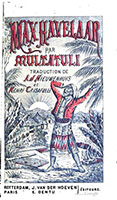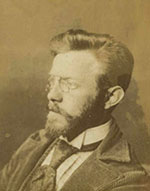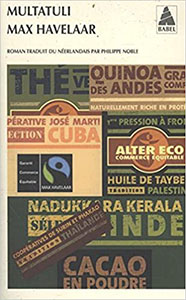Max Havelaar à la française
Max Havelaar was first translated in French in 1876. Translator A.J. Nieuwenhuis regarded Max Havelaar first and foremost as a weapon in the fight against colonial abuse. This would prove to be a general trend in France and French-speaking Belgium until the mid-20th century: Multatuli became a weapon in the political struggle of his mostly socialist or anarchist translators and reviewers. The literary qualities of his book were hardly considered until 1943.
A political novel

Cover of the first French Max Havelaar (1876)
Multatuli first appeared in the French press in 1860, when the Annuaire des Deux Mondes briefly mentioned the commotion caused by Max Havelaar in the Dutch Parliament. The journalist also devoted some favourable words to the literary quality of the work: he considered it "dramatique et en quelque sorte poétique," Multatuli mastering an "attrait de style qui l'a placé au rang des écrivains les plus éminents."
In 1867-68, the Germanic-oriented Revue Moderne published the first four chapters of the Havelaar in a translation by A.J. Nieuwenhuis. His complete translation, in collaboration with French author Henri Crisafulli, was issued in 1876. Nieuwenhuis was a Saint-Simonian, freethinker and freemason. In 1857 he emigrated to France, where he translated Saint-Simonian works into Dutch and publishes a few booklets on Christianity and freemasonry. In the early 1860s he came into contact with Douwes Dekker, who would later say of him: "He had something of an ideal Jesus... He was a zealot, always wanting to improve the state, the church, the masonry, the air railway... whatever.” Nieuwenhuis saw the Max Havelaar primarily as a weapon in the struggle against colonial abuse. This would prove to be a general tendency in France in the following decades. Multatuli became a weapon in the political struggle of his translators, a martyr to bourgeois society. The literary qualities of his work were secondary.
In the French press, the publication of the book elicited almost no reactions. In 1900, another Multatuli translator, Alexander Cohen, wrote from Paris to Mimi Douwes Dekker: "Nobody here knows 'The Havelaar' - which is hardly regrettable, given the terrible 'translation' of Nieuwenhuis and Crisafulli. That Crisafulli died a few weeks ago, by the way, which was his just reward - though he received it a little late - for his messy work.”
No literary qualities

Multatuli translator Alexander Cohen
Multatuli's death in 1887 renewed attention for his work. In the international-leftist periodical La Société Nouvelle, editor Cesar de Paepe emphatically presented Multatuli as a socialist. His introduction to the life and works of Douwes Dekker was followed by a good number of translations, including the first chapters of Max Havelaar by Cornélie Doff.
Multatuli's fame reached a peak in the years 1892-94, particularly thanks to an article by Louis van Keymeulen in the much-read Revue des deux Mondes, "Multatuli. Un écrivain hollandais." Several translators and commentators would subsequently refer to this study. For Van Keymeulen, Multatuli was a well-bred sort of anarchist, a positivist atheist with sympathy for Christ. He portrayed Multatuli as anti-socialist and anti-authoritarian but believing in the ideal of a state governed by an enlightened mind such as his own. Van Keymeulen did not consider his "negative utopias and optimistic materialism" applicable to Dutch practice, but he did acknowledge Multatuli's merit of having awakened the nation and its conscience. From a literary point of view, his verdict was not very favorable: on Max Havelaar, Van Keymeulen stated that it was not so much a novel as a fragment of an autobiography. Moreover, the style and structure were not to his taste:
"Si nous avions à juger Max Havelaar comme un roman ordinaire, nous en parlerions avec sévérité et peut-être n'en parlerions-nous pas du tout. L'action presque nulle, mal conduite et médiocrement intéressante, se traîne de chapitre en chapitre entre des conversations sans vivacité et des descriptions en style d'ingénieur. "
This opinion was shared by literary critic Theodor de Wyzewa, who devoted several articles to foreign literature between 1895 and 1897, mainly in the Revue des Deux Mondes. He wrote of Multatuli: "les qualités dominantes de la littérature hollandaise d'aujourd'hui sont celles précisément dont il manque le plus: la clarté, la simplicité, une correction toute classique de la composition et du style."
In the slow, irregular prose stream called Max Havelaar, only the story of Saïdjah and Adinda has real literary value, declared Van Keymeulen. If the rest of the book had been like that, it would deserve to be praised not only from a human point of view, but also from a literary one. Given this assessment, it is not surprising that over the years, Saïdjah and Adinda was translated and published several times in different periodicals.
In these years Multatuli had no fewer than five regular translators: Julius Pée, Henry Meyners d'Estrey, Roland de Marès, Alexandre Cohen and Emile van Heurck. Pée, a socialist and great expert on Multatuli, was the central figure of this group, which maintained regular contacts among itself. The most interesting figure is Alexander Cohen, who became acquainted with Multatuli's work when he spent most of his service time in military prisons due to his rebellious nature. He had to move to Paris because of lese-majesty in 1888, where he translated Domela Nieuwenhuis, Multatuli, but also Zola. The year after he was deported to London because of his anarchist sympathies. He worked as a journalist for the Revue Blanche, which between 1896 and 1899 published seven of his Multatuli translations, and for the Mercure de France. For the latter he reported on Dutch literature for a while, and in this role too proved to be an ardent defender of Multatuli.
In 1901 Cohen's dedication was rewarded with the first book edition in French since the Max Havelaar translation of 1876: a compilation entitled Pages Choisies, containing his earlier translations plus several new ones, including passages from the Max Havelaar. The book had its second edition in 1906. The preface was by Anatole France, at that time very popular. The great writer does not appear very much inspired by his subject, mostly writing banalities such as "Multatuli est un écrivain très extraordinaire: il dit ce qu'il pense. Il s'en trouve fort peu de cette sorte en Hollande et ailleurs" or "Il a dans le pessimisme une jovialité charmante et rien n'est plus divertissant que son amère bonne humeur". Finally, he calls Multatuli a Dutch and somewhat less sophisticated Voltaire. In his own introduction, Alexander Cohen places Multatuli in the context of the Dutch society of his day, in a passionate plea in which Douwes Dekker assumes almost messianic proportions.
Style and sentiment

Max Havelaar with a fair trade inspired cover (2003)
It was not until 1937, the fiftieth anniversary of Douwes Dekker's death, that interest was revived. A study in La Nouvelle Revue explicitly identified Multatuli with Max Havelaar. The author, Belgian François Closset, portrayed him as a positivist, as anti-authoritarian and subversive, but at the same time also conservative: a man of contradictions. In 1938, a new selection of texts was published, Pages Choisies de Multatuli, translated by Lode Roelandt, with a preface by Henry Poulaille and a biographical introduction by Julius Pée. Lode Roelandt (1902-1979), pseudonym of J.H. van Droogenbroeck, was active in progressive circles. Again, Multatuli was characterized as an anarchist and "freedom fighter." Most texts are from the Ideën, but the volume also contains a few letters and passages from the Havelaar. In 1942 a somewhat abridged Max Havelaar followed, also translated by Roelandt.
The following year another Max Havelaar was published, translated by Edouard Mousset, who in his preface emphasised the importance of Multatuli's style, which he saw as the perfect expression of feeling: at last, there seemed to be more interest developing in the literary aspects of the work. However, this was not yet universally shared: the critic Maurice Brion argued that the book had lost its topicality and therefore wasted few words on it. From 1945 onwards, there was hardly any mention of Multatuli in the French press. Nevertheless, in 1968 Roelandt published a new edition of his translation of Max Havelaar in Paris, this time in full, with an introduction by J.J. Oversteegen. Although he received the Dutch Nijhoff Prize for it, this edition does not appear to have been discussed in the French press.
In 1969-1970, the Antwerp publisher Beckers published Les maudits de la littérature mondiale in twelve volumes. One of these 'maudits' was Multatuli: Max Havelaar appears as the tenth volume in the series, translated by W. Goos. This translation also went unnoticed.
The final stage of the Havelaar reception began in 1991, with a new translation by Philippe Noble. For Noble, Multatuli is first and foremost a modern writer, who has freed himself from literary tradition in his tone, form and style, and the only great romantic of Dutch literature. Guy Toebosch, who prefaces this edition, shares his view and describes the book as "une forme nouvelle de roman [...], dont les qualités littéraires refoulent au second plan le contenu revendicateur ou justicier." Still, even today Max Havelaar may not be taken in hand in France for its literary qualities. The French publisher understood very well that the (modest) success of the translation was for partly due to the current interest in altermondialism and gave the second edition (2003) a cover inspired by the fairtrade label. In 2021, a new edition came out after Philippe Noble completely revised his translation.
(Kim Andringa)
